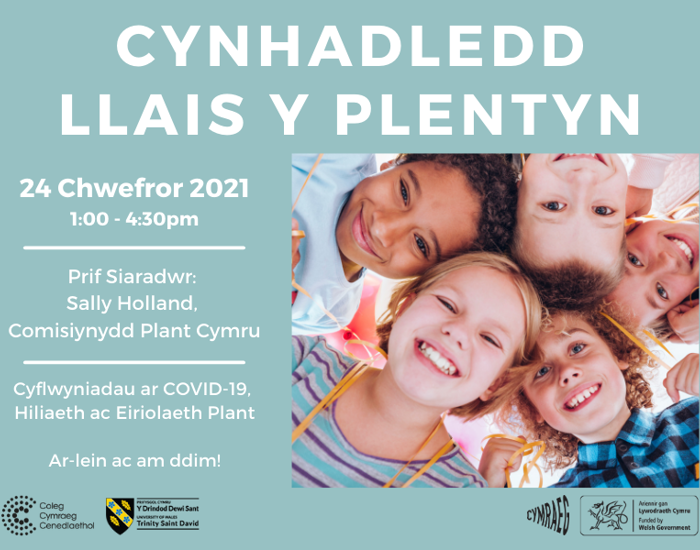The impact of Covid-19 on children in Wales, children’s experiences of racism, child advocacy in Welsh and how to ensure that the child’s voice is identified will be among the issues discussed at a Children’s Rights Conference to be held on-line on Wednesday 24 February.
According to Professor Sally Holland, Children’s Commissioner for Wales, who will deliver the keynote speech, the inequalities that existed before the pandemic have been reinforced over the past year, with children living in poverty, children from black, Asian and minority ethnic backgrounds, and disabled children, having more difficulty accessing their rights than their peers.
During the conference the Children’s Commissioner for Wales will share the findings of two major surveys on the views of children and young people at key points during the pandemic, and provide an assessment of the adequacy of the response by the government and public services.
Professor Holland said:
“The global pandemic has presented huge challenges for children. The participants in today’s conference will have an important role in supporting Welsh children over the next months and years so that they have an equal opportunity to recover from their experiences and fulfil their potential. I’m delighted to have the chance to exchange ideas with them.”
This will be the first conference of the Coleg Cymraeg Cenedlaethol’s Education, Children and Youth Care Studies Panel organised by the University of Wales Trinity Saint David with a Co-operative Grant from the Coleg Cymraeg. The event is targeted at University students, learners in further education colleges and workers in the field.
Gwilym Dyfri Jones, Associate Pro Vice Chancellor of the University of Wales Trinity Saint David said:
“The University of Wales Trinity Saint David is delighted to be able to organise this virtual conference with the aid of a grant from the Coleg Cymraeg Cenedlaethol. We are eagerly looking forward to welcoming educators, students and practitioners from across Wales to this co-operative and timely event.”
Dr Sian Lloyd Williams of Aberystwyth University is chair of the Coleg Cymraeg Cenedlaethol’s Education, Children and Youth Care Studies Panel. Dr Williams will run a session with colleagues on how to identify the child’s voice during Covid-19 and will consider the barriers and solutions. She said:
“This is an exciting and current conference that deals with a very important subject and Aberystwyth University is very pleased to be part of it. It is vital to discuss, understand and discover the voice of children in Wales before, and during the COVID outbreak, and this conference enables us to consider and discuss this in Welsh and in a Welsh context”.
Gareth Hicks is a Participation Officer with the Children in Wales charity and specialises in educating people and organisations on racism, increasing cultural awareness, diversity and inclusion, and will hold a session on children’s experiences of racism in Wales. He said:
“Through my work with Children in Wales I work to raise aspirations, build resilience among young people and make a difference in terms of the unfairness that exists in Wales.”
Nia Gwynfor from the National Youth Advocacy Service will hold a session on child advocacy in Welsh. Nia has been working on the Unity Project on behalf of NYAS Cymru, a project offering intensive and holistic support for pregnant young women and young mothers who have experience of being in care. Nia said:
“I am proud to be working for NYAS Cymru and specifically on the Unity Project. I have seen first-hand the value of advocacy and this support and the benefits to the young people that NYAS supports. The success of the project is due to the participation of the young women we support and I look forward to being able to share that with everyone at this important conference. ”
The event will be recorded and shared on the Coleg Cymraeg’s Resources Portal creating a useful resource for people in many areas of teaching. The session on advocacy is important in order to attract the interest of Welsh speakers in relation to the rights of Welsh speaking children, the challenges and attracting more to work in the field.
